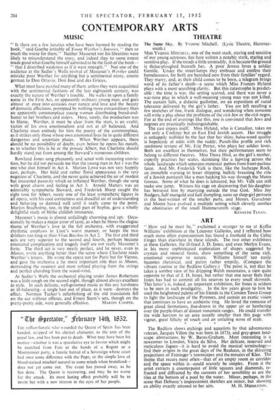CONTEMPORARY ARTS
MUSIC
" IF there are a few lunatics who have been harmed by reading the book," said Goethe irritably of Young Werther's Sorrows," then so much the worse for them." Neither Massenet nor his librettists were likely to misunderstand the story, and indeed they to some 'extent made good what Goethe himself admitted to be the fault of the book- " that I described weakness as if it were strength." Not one of the audience at the Sadler's Wells revival of Massenet's Werther could mistake poor Werther for anything but a sentimental ninny, cousin german to Don Ottavio, Don Jose and des Grieux.
What must have puzzled many of them, unless they were acquainted with the sentimental fashions of the late eighteenth century, was exactly the nature of Werther's trouble. He walks in upon a family scene in the First Act, an apparently ordinary young man, and goes almost at once into ecstasies over nature and love and the beauty of domestic affections, prompted by nothing more extraordinary than an apparently commonplace young woman distributing bread-and- butter to her brothers and sisters. Here, surely, the production was to blame. Werther, it must be clear from the start, is an exalte, victim of his own emotionalism and not at all balanced. And Charlotte must embody for him the poetry of the commonplace, as it strikes only those whose own emotional lives lie in quite different dangerous and uncertain places. When Werther- appears, there should be no possibility of doubt, even before he opens his mouth, as to whether this is he or the prosaic Albert, but Charlotte should hardly stand_out from among the Steward's numerous children.
Rowland Jones sang pleasantly and acted with increasing convic- tion, but he did not persuade me that the young man in Act 1 was the one who shot himself in Act 4. Marion Lowe was not very happily cast, perhaps. Her bold and rather florid appearance is the very negation of Charlotte, and she never quite achieved the air of modest but interested passivity which so inflamed Werther, though she sang with great charm and feeling in Act 3. Arnold Matters was an admirably sympathetic Steward, and Frederick Sharp caught the right tone for Albert, surely one of the least sympathetic figures in all opera, with his cool correctness and dreadful air of understanding and behaving so damned well until it really came to the point. Marion Studholme, too, in the small part of Sophie, gave a wholly delightful study of blithe childish innocence.
Massenet's music is almost unfailingly charming and apt.- Occa- sionally he makes a major error of taste, as when he blares the elegiac theme of Werther's love in the full orchestra, with exaggerated rhythmic emphasis in Liszt's worst manner, or keeps the two drinkers too long at their Vi vat Bacchus in Act 2. The first and third acts are very superior to the second and fourth, perhaps because emotional complication and tragedy itself are not really Massenet's forte. The third act is very nearly perfect, and he never, even in Manor:, wrote anything better than the scene where Charlotte reads Werther's letters. He wrote the opera not for Paris but for Vienna, and gave the orchestra a far more important role than in Manon, demanding the sweetest and most refined playing from the strings and perfect chording from the wood-wind.
At Sadler's Wells the orchestral playing under James Robertson was a little rough on the second night, though almost always excellent in style. In such delicate, well-groomed music as this any harshness or ill-balancing—a single hair out of place, as it were—destroys the effect. Norman Tucker's refurbishing of the old translation fell on the ear without offence, and Ernest Stern's sets, though on the pretty-pretty side, were generally effective. MARTIN COOPER.


























 Previous page
Previous page